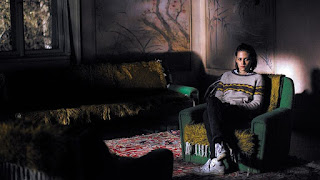The best films of 2017
1. American Honey
Andrea Arnold
2. Grave Julia
Ducournau
3. Paterson
Jim Jarmusch
4. Nelyubov
Andrey Zvyagintsev
5. Personal
Shopper Oliver Assayas
6.
Une vie Stéphane
Brizé
7.
Agasshi Park
Chan-wook
8.
Lady Macbeth
William Oldroyd
9.
Jackie Pablo
Larrain
10.
Sieranevada
Cristi Puiu
11.
Certain women
Kelly Reichardt
12.
Moonlight Barry
Jenkins
13.
Sameblod Amanda
Kernell
14.
Wonderstruck Todd Haynes
15.
Loving Jeff
Nicholls
16.
Una mujer fantástica
Sebastián Lelio
17.
20th Century Women
Mike Mills
18.
A monster calls
J.A. Bayona
American honey is a parable on freedom. A young woman,Star, joins a troupe of youngsters that sell
magazine subscriptions. Apparently an alternative way of living, but it is
ruled by the same laws of making money, as in the 'real' world. She falls for
Jake but he is not the romantic lover he claims to be, he is just a petty thief
who steals personal jewellery from his 'clients'. His feelings for Star are
ambiguous, to say the least. We are in
the Midwest, Trump’s country. In the end
Star buys food for 2 kids in a house, in a milieu she knows so well, with a mom
on drugs and a man flat out on the floor. Scenes of poverty and disarray never seen in an American fiction film.
Grave chooses another route for a young woman’s journey into
the understanding of herself. Justine enters the vet school where her sister
is. The action is set against the hazing period. This debut film by Julia Ducorneau is a rollercoaster. The scenes that lead to
the eating of her sister’s finger (peeing on the rooftop, the Brazilian wax
goes wrong, the fainting of Alex, the older sister, the craving for the
finger) and the eating make one of the
best sequences I saw this year. The film is (not) about cannibalism: it’s about the awareness of the body, about desire, the discovery of sexuality, ultimately about sisterhood, fighting and settling, finding a solution. it’s
about coming to terms with who one is
and the refusal to conform.
Personal shopper and
Paterson both concentrate on one character.
Maureen, brilliantly played by
Kirsten Stewart, is the personal
shopper, who tries to make
contact with her twin brother, who has passed away. It starts in the house, where he died, hoping
to receive a signal from him and it ends in the house, where her
boyfriend stays in Oman, where it
appears her own spirit is present. This
meditative journey annex thriller is a beautiful portrait of modern times,
where the material, the digital and the spiritual world mix. On her journey to
London and back to Paris to pick up
clothes for the renowned actress or model she works for, a stranger sends her
text messages and he gets her tell what she is afraid of , what she would be;
he even persuades her to put on a dress of
her boss, an infringment, and send him a
photo. Her mistress gets murdered, the
old house has been sold, her brother’s partner has found a new boyfriend, time to move on, life goes on.
Personal shopper has many different houses,
rooms and spaces. In Paterson there’s really one house, a kind of Charleston. (
Charleston, near Lewes in East Sussex,
England, the country home of Vanessa
Bell and Duncan Grant, decorated by Bell and others ).. Paterson (Adam Driver)
wakes up, drives a bus, writes down his
poems during lunch hour, eats with his very creative wife (played by Golshifteh
Farahani) , takes the dog for a walk and
ends his day with a beer in the pub. A daily routine of beauty, in one place, the name of the town being
Paterson, slightly shaking up by an
accident involving the destruction of his manuscript of poems. The film
is not an adaptation of the epic
poem Paterson the American poet William
Carlos Williams published, in five volumes, from 1946 to 1958. Williams lived
and worked in Paterson. Williams held
the conviction that poetry was, in his friend Kenneth Burke's phrase,
'equipment for living, a necessary guide amid the bewilderments of life.' That spirit is in the film.
The ending of a film is
mostly reassuring: end of the story, end
of the character(s), all’s well, everything is neatly wrapped up. Thank God films don’t end with the
title The End or Fin anymore. In two
of the saddest films of the year Nelybov, better known in the English title Loveless, and Stephane Brizé’s
stunning film adaptation of Guy de Maupassant’s novel, Une vie, the ending is ambiguous perhaps deceitful.
Loveless
is a portrait of Russia under Putin, a
society disintegrating, governed
by fake news, about a couple about to divorce and the search for their son, who
has had enough and leaves. Un Vie shows
30 years of the life of an aristocratic woman at the beginning of the
nineteenth century in France. Lies and deceit are disclosed. Is Jeanne’s son really coming to live with
her? Or is it another false promise? Is Aleksej, the lost son really dead, does the couple deny him, when they during an
identification in the morgue are confronted with a corpse, or did he escape
their hell?
Best films of the year 2017 :
According to Cahiers du Cinema
According to Film Comment
According to Sight & Sound
According to Little White Lies
According to Esquire
According to Filmkrant












